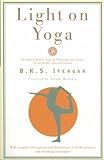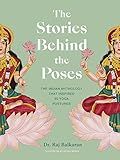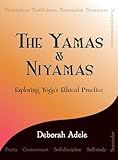Best Yoga Books for Beginners to Buy in February 2026

Science of Yoga: Understand the Anatomy and Physiology to Perfect Your Practice (DK Science of)



2,100 Asanas: The Complete Yoga Poses



Light on Yoga: The Bible of Modern Yoga
- COMPREHENSIVE GUIDES FOR ALL POSTURES ENHANCE USER CONFIDENCE.
- ENGAGING ILLUSTRATIONS SIMPLIFY LEARNING AND RETENTION.
- BREATHING TECHNIQUES BOOST RELAXATION AND EFFECTIVENESS.



The Yoga Bible



The Stories Behind the Poses: The Indian mythology that inspired 50 yoga postures



Yoga Anatomy Coloring Book: A Visual Guide to Form, Function, and Movement - An Educational Anatomy Coloring Book for Medical Students, Yoga ... & Adults (Volume 1) (Anatomy Coloring Books)



The Yamas & Niyamas: Exploring Yoga's Ethical Practice
- DISCOVER CORE PRINCIPLES OF YOGA PHILOSOPHY FOR PERSONAL GROWTH.
- ENHANCE YOUR PRACTICE WITH PRACTICAL APPLICATIONS OF YAMAS AND NIYAMAS.
- TRANSFORM YOUR LIFE BY INTEGRATING ANCIENT WISDOM INTO DAILY ROUTINES.


Yoga is a holistic practice that originated in ancient India, encompassing physical, mental, and spiritual disciplines aimed at achieving harmony and balance in the individual. The word "yoga" is derived from the Sanskrit root "yuj," meaning to yoke or unite, symbolizing the union of body, mind, and spirit.
While there are various forms and styles of yoga, most practices typically involve physical postures (asanas), breathing exercises (pranayama), and meditation. These components work together to promote flexibility, strength, relaxation, and mental clarity.
Yoga is not only a physical exercise but also a philosophy and way of life. It emphasizes self-awareness, mindfulness, and compassion, encouraging practitioners to cultivate a deeper understanding of themselves and their connection to the world around them.
Over time, yoga has evolved into different branches, including Hatha, Ashtanga, Vinyasa, Kundalini, and Iyengar, each with its own unique emphasis and approach. Regardless of the style, yoga is ultimately about cultivating balance, inner peace, and well-being.
Yoga has become increasingly popular for several reasons:
- Health and Wellness Benefits: Yoga offers a wide range of physical and mental health benefits. It improves flexibility, strength, and balance, enhances cardiovascular health, reduces stress, and promotes relaxation and overall well-being. As people become more health-conscious, they turn to yoga as a holistic way to improve their physical and mental health.
- Accessibility: Yoga can be practiced by people of all ages, fitness levels, and abilities. It doesn't require expensive equipment or a specific setting, making it accessible to a broad audience. Additionally, there are various styles and levels of yoga, allowing individuals to find a practice that suits their needs and preferences.
- Stress Relief: In today's fast-paced world, stress has become a common concern for many people. Yoga offers effective stress relief through breathing exercises, relaxation techniques, and mindful movement, helping individuals manage stress and anxiety more effectively.
- Mind-Body Connection: Yoga emphasizes the connection between the body, mind, and spirit. By practicing yoga, individuals can develop greater self-awareness, mindfulness, and emotional resilience, leading to a deeper understanding of themselves and their inner workings.
- Community and Support: Yoga communities provide a supportive and inclusive environment for practitioners to connect with like-minded individuals, share experiences, and learn from each other. This sense of community fosters motivation, accountability, and a sense of belonging, which can enhance the overall yoga experience.
- Celebrity Endorsements and Media Coverage: Many celebrities, athletes, and influencers openly endorse yoga and share their positive experiences with the practice. This exposure through mainstream media channels has helped popularize yoga and increase its appeal to a wider audience.
- Adaptability: Yoga can be adapted to meet individual needs and preferences. Whether someone is looking for a gentle, restorative practice or a more dynamic, physically challenging workout, there are countless variations and styles of yoga to choose from, making it suitable for everyone.
Overall, the combination of physical, mental, and emotional benefits, along with its accessibility and adaptability, has contributed to the widespread popularity of yoga around the world.
